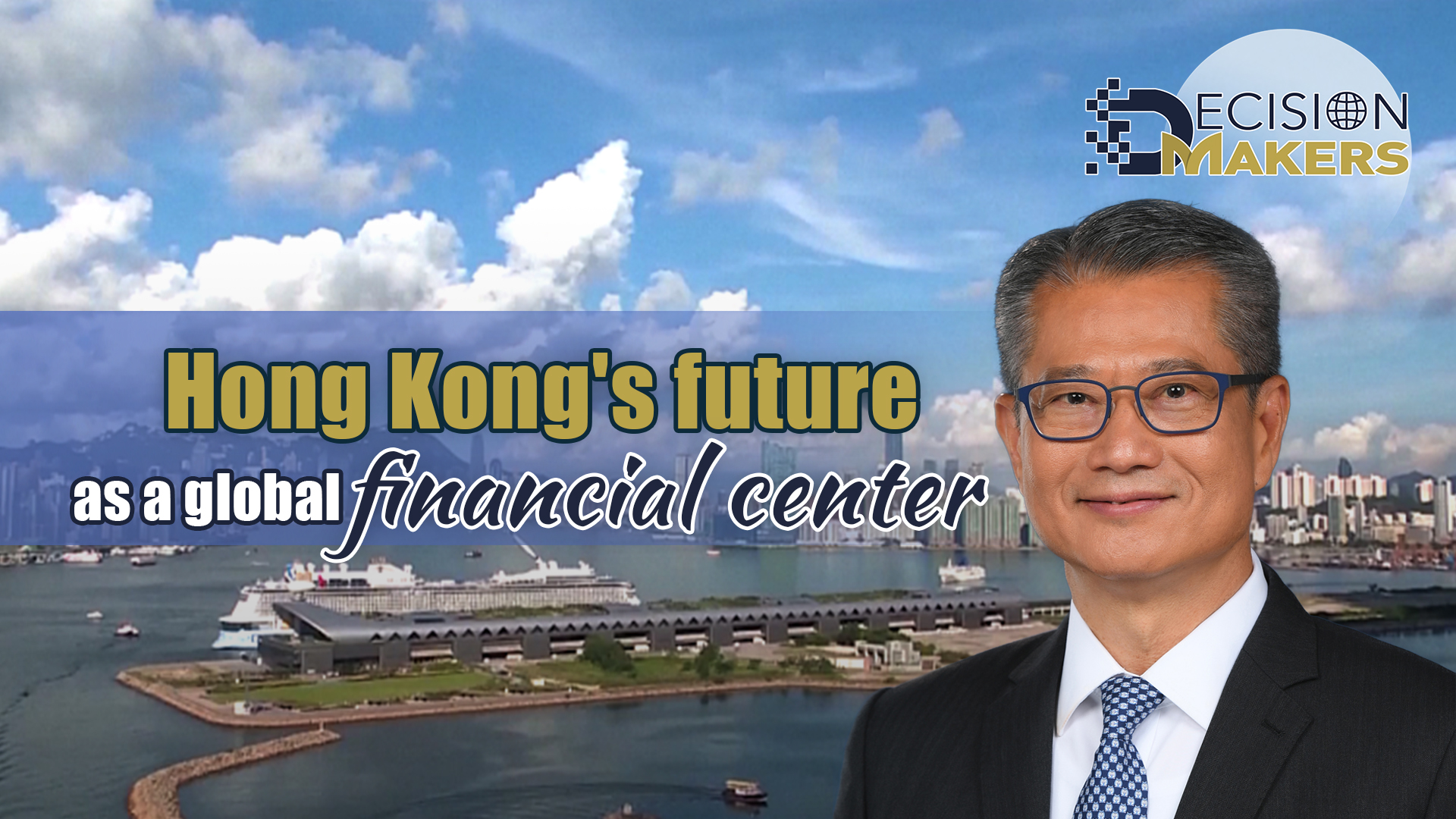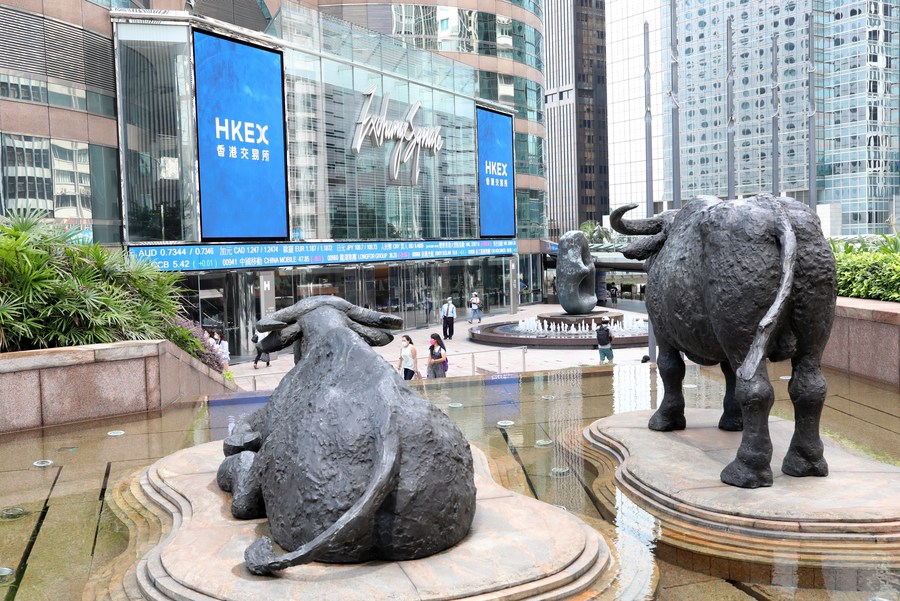
Editor's note: Decision Makers is a global platform for decision makers to share their insights on events shaping today's world. Paul Chan is financial secretary of the Hong Kong Special Administrative Region (HKSAR) government of People's Republic of China. The article reflects the author's opinions and not necessarily the views of CGTN.
Hong Kong's emergence as a global financial center has been one of our city's great success stories... and we are just getting started. As we celebrate the 25th anniversary of the establishment of the Hong Kong Special Administrative Region (HKSAR), I see many opportunities ahead: Closer financial connectivity with the Chinese mainland, the rise of green and sustainable finance and the huge potential for growth and prosperity in the Guangdong-Hong Kong-Macao Greater Bay Area (GBA) are just a few areas where Hong Kong enjoys important competitive advantages over other international financial hubs.
In March 2022, the Global Financial Centres Index again ranked Hong Kong the top financial center in Asia and third in the world. The latest World Investment Report 2021, published by the United Nations Conference on Trade and Development, ranked Hong Kong the world's third largest recipient of foreign direct investment in 2020, trailing only the United States and the mainland.
Despite the continuing pandemic and geopolitical tensions that have been disrupting the global economy, Hong Kong managed to achieve strong economic growth of 6.3 percent in 2021. Even in the face of the adverse impact of the fifth wave of COVID-19, we expect full-year GDP growth of between 1 and 2 percent in 2022.
What makes Hong Kong unique and how are we responding to external stresses? And why does the future look promising for Hong Kong?
Hong Kong's uniqueness stems from the "one country, two systems" framework, the cornerstone of our economy and society. Together with the rule of law and our formidable institutional strengths, they are the defining advantages that have long propelled Hong Kong's success as an international center for finance, commerce and trade.
Looking ahead, the 14th Five-Year Plan (2021-2025) and Long-Range Objectives Through the Year 2035 strategically affirm the role and positioning of Hong Kong in the overall development of our country, presenting opportunities in various areas of importance.
That plan expressly supports Hong Kong in consolidating and enhancing our status as an international financial, transport and trade center, as well as a center for international legal and dispute-resolution services in the Asia-Pacific region.
It also champions Hong Kong's development in four emerging areas: as an international aviation hub, an innovation and technology hub, as a regional intellectual property-trading center, and as a hub for international cultural exchange between our country and the rest of the world.
In achieving these goals, Hong Kong will deploy its unique role as a bridge between the mainland and the rest of the world, while helping mainland companies explore opportunity in international markets.
Our advantage here is unrivalled. Hong Kong is as national as it is international. Let me use the financial sector as an example of how we thrive as one of the world's major hub cities, as well as our country's international financial center.
Hong Kong continues to be one of the leading listing centers in the world. Last year, funds raised through initial public offerings (IPOs) reached over $40 billion. Indeed, we have topped the world seven times in the past 13 years in terms of IPO funding.
We are continuously on the lookout for ways to enhance the competitiveness of our listing platform. A major move a few years back was to allow emerging and innovative enterprises with weighted voting rights structure as well as pre-revenue or pre-profit biotechnology companies to list in Hong Kong and facilitate qualifying issuers to seek secondary listing in Hong Kong.

The statues on the square of Hong Kong Exchanges and Clearing Limited (HKEX) in south China's Hong Kong, July 31, 2021. /Xinhua
The statues on the square of Hong Kong Exchanges and Clearing Limited (HKEX) in south China's Hong Kong, July 31, 2021. /Xinhua
At the end of April 2022, 74 such companies had listed in Hong Kong taking advantage of this change, raising more than $580 billion. That represents over 44 percent of the total IPO funds raised during the same period. In fact, Hong Kong is also now the world's second largest fundraising hub for biotechnology.
In January, 2022, we launched a listing regime for special purpose acquisition companies, providing a new alternative listing route in Hong Kong for emerging enterprises with potential.
We have also made preparations, including various incentives, for "home-coming" China Concept Stock companies to return "home," in light of increased risks and uncertainties of listing in overseas markets. As of May this year, 22 such companies have returned to Hong Kong, the total market capitalization of which accounts for over 70 percent of all China Concept Stocks listed in the United States.
Our asset- and wealth-management sector has also prospered in recent years. At the end of 2020, Hong Kong had $4.5 trillion in assets under management, up 21 percent year on year. Nearly two-thirds of those assets came from non-local investors. Our vision is clear: Boosting Hong Kong's status as an international asset- and wealth-management center. We have been working to realize this in three ways: Modernization of our fund structure regime, tax concessions, and the establishment of the fund re-domiciliation regime last year to attract foreign funds to Hong Kong.
A recent key milestone in the development of our asset- and wealth-management sector was the launching of the Cross-Boundary Wealth Management Connect Scheme in the GBA last October. It opens up a huge market for Hong Kong's financial services providers, giving us direct access to the growing number of high-net-worth individuals in the GBA, one of the most affluent economic regions of the mainland.
Opportunities also flow from mutual market access between the mainland and Hong Kong. Over the years, various "Connect" schemes have come into operation, including Stock Connect, Bond Connect and the mutual recognition of funds. On the equities side, we launched the Hong Kong-Mainland Exchange Traded Funds (ETF) Cross-Listing Scheme in May 2022. The ETF Connect is another milestone in the integration of the capital markets of the mainland and Hong Kong.
Meanwhile, Hong Kong continues to bolster its status as the largest global offshore renminbi (RMB) business hub. Hong Kong counts the largest pool of RMB liquidity in the world outside the mainland, amounting to over 800 billion RMB ($119.5 billion). As the most important offshore RMB clearing hub, Hong Kong's banks handle about 75 percent of global offshore RMB payments.
China's economy will continue to expand and develop under the Belt and Road Initiative and the new development strategy of "dual circulation," which emphasizes the domestic and external markets reinforcing each other. As such, the demand for offshore using, holding and investing of RMB by mainland or foreign enterprises, financial or other institutions is expected to substantially increase.
As the world's largest offshore RMB business hub, Hong Kong is more than a reservoir for providing offshore RMB funds, it has the capacity and capability to develop a vibrant "offshore ecosystem" for the RMB, contributing to the prudent and gradual internationalization of the RMB.
Environmental, social and governance is another fast-emerging trend reshaping the global economy and the financial sector. By leveraging our advantages as an international financial center, Hong Kong can facilitate the matching of international capital with quality green projects, contributing proactively to our country's pursuit of its "3060 carbon emission targets" as well as our own carbon neutrality target by 2050.
Since 2018, the HKSAR government has successfully issued a total of more than $7 billion equivalent of green bonds targeting global institutional investors. These bonds are denominated in U.S. dollars, euro and RMB. At the time of their issuance, the 30-year U.S. dollar-denominated bonds and the 20-year euro-denominated bonds were the longest in tenure ever issued by an Asian government. We also issued our first-ever retail green bonds with an issue size of HK$20 billion (about $2.55 billion), which was then the largest retail green bond ever issued globally.
The successful issuance of RMB green bonds in Hong Kong by the Shenzhen municipal government last October also tells a good story of how mainland cities could make use of our platform for raising funds. This would further strengthen Hong Kong's functions as an offshore RMB hub and a center for green and sustainable finance.
Economies in Asia, particularly the mainland economy, will continue to be the engine of global economic growth. Hong Kong will continue to play our unique role as the international financial center of the country and actively integrate into its overall development strategy. By serving the needs of the country with our competitive strengths and building on the staunch support of the country, Hong Kong's financial industry will undoubtedly scale new heights in the years to come.
(If you want to contribute and have specific expertise, please contact us at opinions@cgtn.com. Follow @thouse_opinions on Twitter to discover the latest commentaries in the CGTN Opinion Section.)

